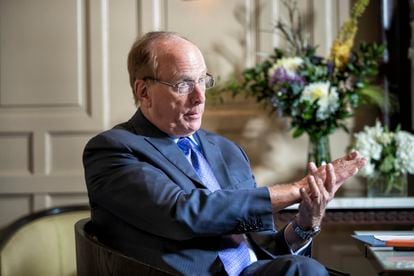It’s Tuesday, 9am on April 23. Nearly 200 guests collect their accreditations at the Ritz Hotel in Madrid. Among the group are CEOs, bankers, lawyers and directors of fund management companies. After finishing their coffee, they enter a large room in the luxury hotel: BlackRock’s annual meeting with investors is about to start. Everyone wants to hear Larry Fink. Why? Because he is the most powerful person on Wall Street. He is the chairman and CEO of BlackRock, the largest money-management firm in the world, with more than $9 trillion in assets under management. If BlackRock were a country, it would be the third largest economy on the planet, after the United States and China. Former banker and writer William D. Cohan has compared Fink to the Wizard of Oz: “He’s the man behind the curtain.”
Fink begins his speech with a message of warning: “The world is in a transition. And transitions are frightening. They’re messy.” He lists a series of problems as if naming the scourges of a Biblical plague: demographic winter, fragmentation, the energy crisis, inflation and populism. He speaks about the lack of hope. But suddenly, the pessimism gives way to optimism. It’s as if he realized he is talking to potential customers, and switches gear. To manage this jump, he pulls inspiration from Dickens: it was the best of times, it was the worst of times. “After a long period with negative interest rates, we now have an opportunity to invest in earning a yield. I believe there are better opportunities today than three years ago. I would run into the market, not run away from it.”
Fink shares his vision of the world for 35 minutes. He makes clear his Darwinian conception of investment. It’s a zero sum game. For some to win, others must lose. Not even a 20-year-old could cope with the chairman’s jam-packed schedule. He arrived in Spain early in the morning, and left the country less than 24 hours later. After finishing the conference at the Ritz Hotel, he finds time to talk exclusively to EL PAÍS. The conversation begins with Fink’s penchant for letters. Every year, he sends one to his clients and one to the world’s top business leaders. The last letter is dated March 15. At that point, the world was fearing a new financial crisis due to the collapse of Silicon Valley Bank (SVB).
Question. Supervisors have taken a series of measures to address the banking crisis, and panic in the United States has eased. Do you think that the risk of another financial crisis is over?
Answer. The risk has not yet disappeared. But instead of a real major crisis, it was few small regional banks showing that they were exposed to rising rates. They took deposits in the short term and invested in the long term. I think what it did, though, was highlight the bigger macro question over the 4,000 banks in the United States. Is there a need for 4000 banks? That’s the big social question here. Many people believe that the regional bank plays a vital role in local communities. But these few banks were excessive in risk taking. There’s a few more banks that probably are going to be resolved in the next few weeks.
Q. BlackRock was a shareholder of SVB. Didn’t it see anything unusual in the way the entity managed its balance sheet?
A. That was just in index funds. We were not an owner, an active investor. We invested in it as a fiduciary.
Q. In your letter, you spoke of a crisis in slow motion: a succession of dominoes falling due to the large monetary and fiscal stimulus that were approved after Covid. The first domino to fall was low inflation; the second, the solidity of some banks, and now you warn of a third problem that is to come: liquidity. What are you referring to?
A. It is a much bigger problem and particularly affects pension funds, especially those that are more leveraged. Over the last 15 years, the best investment would have been investing in illiquids [assets that are not as easy to sell as stocks or bonds]. Liquidity is no longer free. Liquidity is now at 5% in the United States. Many long-term investors are going to need liquidity and to pay for it they will need to sell illiquid assets from their portfolios, often with a deterioration in their valuation.
Q. Do you think central banks have gone too far and too fast raising rates?
A. No. Their mandate is a) controlling inflation and b) financial stability. Financial stability is not so bad. But the problem we have is that at the same time that interest rates are raised to cool prices, we have aggressive fiscal stimulus from governments. It’s making the central banks have a harder time.
Q. Do you think inflation is still the main economic threat?
A. Verus what?
Q. Fragmentation, populism, trade wars?
A. I think inflation is a result of populism. I think inflation is a result of fragmentation. I don’t think inflation happens by itself. Inflation happens by policy and policies, whether it’s excessive fiscal stimulus policy, or measures to restrict immigration. And above all it is a consequence of economic fragmentation. Every corporation I talk to has questions about whether they should be so dependent on China. And that’s creating a big shift. At the same time, we have fragmentation created by governments. We’re worried about national security.

Q. You were very critical of Donald Trump for his nationalist view of the economy and anti-globalization stance. But now the Biden government has started a subsidy war with the approval of the Inflation Reduction Act (IRA).
A. I don’t call it a war.
Q. What would you call it then?
A. When I talk to European prime ministers they’ve told me, it’s not a war — we should follow the same thing; we should encourage more investing. Europe historically does things with a stick, not with a carrot. They tax everything, and that is not always efficient. What the subsidies are going to do is increase willingness to invest in the United States. The problem in Europe is also obtaining permits for projects. That, and the IRA subsidies, are going to make companies prefer to invest in the United States.
Q. Do you think Europe should approve its own IRA?
A. I would think that would be the best thing for the world. If the world decarbonizes faster, why is that a bad thing?
Q. In your conference, you insinuated that you are more confident in technology than in politicians when it comes to achieving decarbonization. Why is that?
A. I’m not. What I believe is that if we’re going to have a fair and just transition, we’re going to transition away from some traditional energy. We need to create alternative energy that is as cost efficient. So I believe we need to create new technologies to bring down the cost of decarbonized technologies so we can fundamentally compete.
Q. Do you think the energy response to the war in Ukraine has been a step backwards in terms of decarbonization?
A. It’s a step back in the short run, since countries like Germany are using more coal. But it’s a step forward in many ways because it identifies the need to create alternative energy sources. I would argue crises like the Ukraine war should accelerate decarbonization. Think about Europe. Europe does not have its own sources of energy, with the exception of Norway and parts of Great Britain. Europe needs to build its own sources. I think what the Ukraine invasion showed was the dependency that Europe has [on fossil fuels].
Q. In the market, more and more investments claim to be sustainable, while more and more companies use climate efficiency as a selling point. Do you think there is a risk of greenwashing in the market?
A. No. I don’t agree with the concept of greenwashing. That’s a label. We’ve got to stop labeling. We spend too much time on it. We need to spend time thinking about how we can build better resiliency so our economies can drive more economic growth. Labels are convenient and they’re good for headlines. I believe we should be working with the energy companies, not against them. We have to be honest, we have to be deliberate. We need to be working with governments to try to move forward. This is why I believe Europe needs to have its own type of program to accelerate decarbonization.

Q. In addition to energy transition, another one of your favorite issues is saving for retirement. Do you think that public pensions are not guaranteed?
A. The biggest issue for pensions is not in corporations, it’s at smaller businesses. The reality is the small little companies are not providing it. That’s one of the big reasons why we have lost hope in the world: more and more people are getting near retirement and they have no savings.
Q. BlackRock does business with private pension fund. What do you say to people who think that BlackRock is interested in raising fear over the sustainability of pension funds?
A. That’s once again, another myth. We’re not fear mongers. Our job is to be problem solvers and to work with companies and governments. We’re the largest retirement manager in the world. That’s not because we are creating fear. We are creating opportunity.
Q. Your company has more than $9 trillion in assets under management, and the biggest driver of growth in recent years has been index products. Some experts believe that there is a bubble in passive investment. What do you think?
A. First of all, who says it today? I don’t agree with it. I would challenge anyone who believes that. More and more ETFs [exchange-traded funds] investors are active investors. If you looked at the last year or two, the growth in ETFs is more in fixed income. You have better price discovery owning a fixed income ETF than you do in the underlying bonds. When you have to own an underlying bond index, you have to own 3,000 bonds. You get one or two ETF to get your exposures in bonds with better price discovery, price, transparency and execution. More and more active investors are using these hybrid instruments. They buy an ETF, which is an index, but they’re actively trading it.
Q. Does a company the size of BlackRock present a systemic risk?
A. I would challenge that too. One hundred percent of the money is not ours. There is no leverage. When we have systemic risk, it’s based on leverage. When you look at Silicon Valley Bank, it was a leveraged bank institution that had short term deposits and long term assets. Because we’re the largest manager of retirement money, we have a long-term outlook. And in almost every conversation I’ve had with regulators, they have said we’re not systemic. In 2005, the banking system was responsible for a large percentage of the economy. Today, the capital markets are responsible for a larger percentage in banking. Does that represent risk? Is that systemic risk? How should we manage it? I’m not against having a commission to see how the capital markets grows. I could justify that. But to you to say that we’re systemic, that means we’re looking through the lens of a bank.
Q. What do you think about cryptocurrencies?
A. I’m a believer in bitcoin. I believe everything BlackRock does is sell hope. Why would anybody take their money out of a bank account to invest in 30 years? You better really hope that in the next 30 years you have a good outcome. I think Bitcoin is the ultimate fear of security. You don’t trust your government, you’re worried about debasement of currency, you want to have something that is cross-border. To me it is not a currency, it’s just another asset class. It is digital gold. But with the rest of crypto, most of it was just foolhardy. Crypto is supposed to be about a decentralized ledger. Bitcoin is a decentralized ledger. FTX was a closed ledger. That’s why we’re studying tokenization of stocks and bonds. I believe that would be a great opportunity. I believe the technology around crypto can be the leading technology as we think about tokenization, and that’s why we have an open mind.
Q. BlackRock lost money in the FTX collapse. What lessons have you learned from this investment?
A. We lost $18 million, which in the context of $9 trillion assets under management, was nothing. It was invested through one of our venture capital funds. I can tell you we did a full review of the due diligence [the investigation done prior to making an investment].
Q. As artificial intelligence becomes more advanced, do you think a time will come when robots substitute portfolio manager?
A. I’m waiting for the time when they substitute CEOs [laughs].
Q. Speaking of which, have you ever thought about your retirement?
A. I’m 70 years old, but I still love my job. The board and I focus on this quite a bit. We are very active in reviewing the next generation of leaders.
Sign up for our weekly newsletter to get more English-language news coverage from EL PAÍS USA Edition





